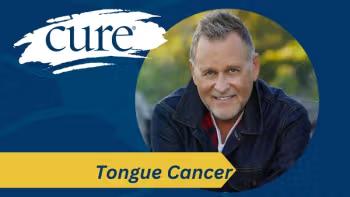
- Spring 2020
- Volume 8
- Issue 2
Speaking Up About Head and Neck Cancers
Voice actor Rob Paulsen opens up about how a lump on his neck led to a stage 3 diagnosis.
Most people know him best as the voice of Yakko Warner of “Animaniacs,” Pinky of “Pinky and the Brain” and Raphael of “Teenage Mutant Ninja Turtles.” But it’s what Rob Paulsen does outside of TV that brings him an extra sense of gratitude.
In 2016, Paulsen noticed a lump on the left side of his neck, but it didn’t hurt or affect his day-to-day activities. When he finally had it checked, he learned that he had stage 3 metastatic squamous cell carcinoma.
Paulsen quickly started treatment and now deals with some lasting side effects, such as taste issues and exhaustion. But he’s keeping busy as the new spokesperson for the Head and Neck Cancer Alliance, raising awareness and offering advice about the implications of this type of cancer.
In an interview with Heal ®, Paulsen discussed his immediate reaction to learning of his cancer and emphasized the importance of support systems.
Heal ®: You make your living with your voice. What was it like to learn you had throat cancer?
Paulsen: I remember my ENT (ear, nose and throat specialist) called and said, “How are you feeling?” And I said, “I don’t know. How am I feeling?” And he said, “It’s cancer.” It was kind of like being a little bit gobsmacked. But neither I nor my wife flipped out. Neither of us were like, “Oh my God, why me?” My wife is a breast cancer survivor from 20 years ago, and the response was more like “Well, that’s kind of surprising.” And then when things settled down, we thought, “Why not us?” Cancer is an equal opportunity offender. It doesn’t distinguish between people who deserve it and (people) who don’t.
I also had the experience, I don’t even know how many times, in which I had the incredible gift of speaking with parents and their children, many of whom had cancer and other ailments that made it clear to them at the beginning that their children weren’t going to make it to sometimes 7 or 8 or 15 or 20 (years old). Once things settled in, it (provided remarkable context) in terms of what is bad news. It’s never good news.
But to have had the experience of seeing how parents deal with their children, knowing that their children aren’t going to make it out of the hospital in the way in which they’d hoped... I’d seen that right up close from parents who wanted their kids to talk with Raphael, Pinky or Yakko. That was pretty mind-blowing in terms of how one deals with the worst possible news one could ever receive about their most precious thing.
It put in perspective what my struggle was going to be. I think you can’t quantify the struggle until the people who love you go through it with you. That’s something that’s kind of all unknown. But I was told quite quickly, “We can cure you. However, before we do, we almost have to kill you.” And the art, I learned, of medicine is how close you can take someone to the edge to kill the bad stuff and not kill them. But the collateral damage is the people who love you, because they have to watch. It’s people who love me and have known me for 25 to 30 years, and they have to watch me go through it.
How taxing was treatment?
In short, it was certainly the most difficult physical thing I’ve ever gone through. I had seven weeks of daily radiation to my head and neck. I also had eight concurrent chemotherapy treatments. But the cumulative effect of the radiation was tough. I had a lot of mouth sores. I couldn’t swallow or eat. It takes a toll on your body. I lost 50 pounds, which I didn’t have to lose.
What is the importance of a support system?
You can’t say enough of how important that is. I understand that when people hear this, there will be folks who have to deal with this treatment alone — “alone” is in quotes. There are the medical professionals. The Head and Neck Cancer Alliance offers (help), and there are people who are willing to give you phone support.
I have a friend of a friend who’s going through her own HPV-related cancer — my cancer and the cancers about which we’re speaking, by and large, in this realm are human papillomavirus induced. The woman is about 70 and going through it now. And she has a different kind of support system, but very helpful nonetheless, in the guise of myself and people who are willing to help take her to treatment and chat with her and get her whatever she needs.
A support system is a support system. There are resources available. And it is important to not sell short how important those resources can be for people who have to deal with this on their own and do not have the vital support that I had.
What advice do you have for others who may be facing a similar diagnosis?
Don’t be afraid to embrace anyone around you who wants to help. I wanted to be strong. I knew there would be a point at which I couldn’t do it anymore for a while, so that’s how I wanted to move through it. By the same token, if somebody says, “Honey, I really want to drive you to radiation treatments,” don’t push them out. I had people who respected me doing it the way I wanted to do it. But it’s really about sharing the burden.
If you don’t have someone in your life who is able or willing to hold your hand literally and go through it with you, then man, what I can tell you is that laughter is the best medicine. And the cool thing is you can’t OD and the refills are free. If you can find a way to laugh about anything, about how many times you’ve hiccupped today because all of a sudden the radiation tickled your vagus nerve, and you call your oncologist at 2 o’clock in the morning, saying, “I’ve been hiccupping for two hours, and I’m afraid I’m going to break a rib.” And they say, “Oh, no, we got you covered.” You have to find a way, in my view, to find the humor in circumstances, whatever it is, whether it’s movies, music, watching comedy — anything that brings you joy and makes you smile. It turns out that my ability to laugh and be positive and trying to find the humor in a dark situation was for me a big deal. It may not work for everyone. But for me, humor is a big part of the equation.
Articles in this issue
over 5 years ago
Memory Issues? Acid Reflux Drugs Could Be To Blameover 5 years ago
Laughing Through Lymphomaover 5 years ago
Thriving With Incurable Cancerover 5 years ago
Childhood Cancer Survivors See Uptick in Colorectal Polypsover 5 years ago
Overheard on Social Media, Advice From People Like Youover 5 years ago
Diabetes After Cancer: There's No Glossing Over The Truth

